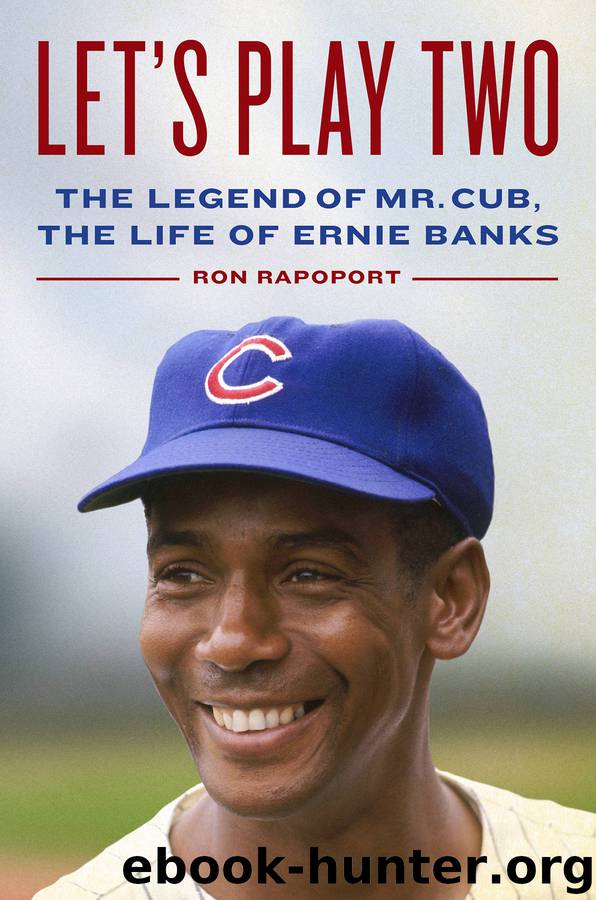Let's Play Two by Ron Rapoport

Author:Ron Rapoport
Language: eng
Format: epub
Publisher: Hachette Books
Published: 2019-04-01T16:00:00+00:00
As the years went by and the early days of the civil rights movement became the stuff of history and of memory, the actions of Banks and other athletes of his era who had not participated came to be seen in a different light. They had not marched or spoken out, but they had left their mark just the same.
“He played his role because he proved something that we as blacks already knew,” says Timuel Black, Chicago’s nonagenarian civil rights activist and historian. “It was that given the opportunity, we’re just as good as anyone else, and better than most.” Banks’s insistence on leading by example may have frustrated militants, Black says, but it had merit nevertheless. Black relates it to a distant memory of being on a playground when he was twelve years old and listening to the words of Al Pullins, one of the original Harlem Globetrotters. “Let me tell you something, Shorty,” Pullins said. “When everybody is running around, you stay cool. If you stay cool, you’ll break up the game.”
“It stayed with me,” Black says. “Ernie Banks and the black athletes of that time personified it in the world they had to live in. Be cool. Ernie Banks was not just a baseball player. He had to adjust to the social and cultural world he had to live in if he was going to be successful. And he was.”
Jesse Jackson is also sympathetic to Banks’s approach. “Some heroes, their strength is not talking, it’s doing,” Jackson says. “Ernie Banks came to symbolize something bigger than life.” Jackson, who saw Banks often over the years, was convinced that Banks was concerned about the struggle for civil rights even if he didn’t speak out. “Sometimes, people express their pain in extroverted ways and sometimes people internalize it,” Jackson says. “Ernie internalized his pain.” It is important, Jackson says, to remember the timetable of events on the road toward racial equality and how one milestone led to another. “We knew Ernie Banks,” he says, “before we knew Martin Luther King.”
As Banks grew older, he reassessed his role in the civil rights movement, and for the first time began to express a measure of regret. “We were there, but we weren’t there,” he told Timothy J. Gilfoyle of the Chicago Historical Society in 1997. “Our life was in baseball. We didn’t get involved in the marches and demonstrations because we were in baseball.”
Nine years later, when he was seventy-five, Banks gave his most heartfelt expression of what might have been. “That’s a real void in my life,” he told Steve Jacobson for his book Carrying Jackie’s Torch. “I see a lot of people today who struggled and went to jail and the dogs were after them, and I’d look ’em in the eyes and say, ‘God almighty, I wish I’d ’a been there.’ My children, sometimes they think about, ‘Daddy, where were you all the times that struggle was going on?’ And I could only answer one way: ‘I was playing baseball.
Download
This site does not store any files on its server. We only index and link to content provided by other sites. Please contact the content providers to delete copyright contents if any and email us, we'll remove relevant links or contents immediately.
| African-American & Black | Australian |
| Chinese | Hispanic & Latino |
| Irish | Japanese |
| Jewish | Native American & Aboriginal |
| Scandinavian |
Becoming by Michelle Obama(10026)
Beartown by Fredrik Backman(5751)
The Last Black Unicorn by Tiffany Haddish(5635)
Man's Search for Meaning by Viktor Frankl(4604)
The Book of Joy by Dalai Lama(3986)
The Five People You Meet in Heaven by Mitch Albom(3567)
In a Sunburned Country by Bill Bryson(3542)
The Choice by Edith Eva Eger(3468)
Full Circle by Michael Palin(3448)
The Mamba Mentality by Kobe Bryant(3276)
The Social Psychology of Inequality by Unknown(3029)
Imagine Me by Tahereh Mafi(2955)
Book of Life by Deborah Harkness(2938)
The Checklist Manifesto by Atul Gawande(2852)
Less by Andrew Sean Greer(2694)
A Burst of Light by Audre Lorde(2604)
The Big Twitch by Sean Dooley(2436)
No Room for Small Dreams by Shimon Peres(2368)
Everest the Cruel Way by Joe Tasker(2341)
